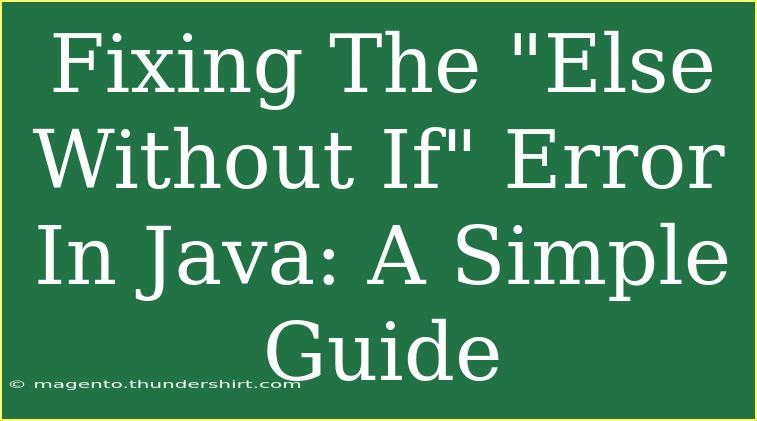Encountering the "Else Without If" error in Java can be quite frustrating, especially for those who are just starting out with programming. This error usually signals that there’s a structural issue in your code—often stemming from incorrect syntax or logic. In this guide, we’ll explore what this error means, why it occurs, and how to fix it effectively. Additionally, we’ll share tips, common pitfalls to avoid, and answer some frequently asked questions that might pop up in your coding journey. 🚀
What Does "Else Without If" Mean?
The "Else Without If" error essentially occurs when the Java compiler encounters an else statement that doesn’t have a preceding if statement to pair with. This might happen due to a misplacement of curly braces or if you have mistakenly removed an if condition.
Basic Structure of If-Else Statements
Before we dive into fixing this error, it’s crucial to understand the basic structure of if-else statements in Java:
if (condition) {
// Execute code if condition is true
} else {
// Execute code if condition is false
}
When you adhere to this structure, you’ll likely steer clear of the "Else Without If" error.
Common Causes of the Error
Here are some common scenarios that lead to the "Else Without If" error:
- Missing Curly Braces: Sometimes, omitting curly braces can lead to confusion in your code structure.
- Improper Nesting of Statements: Having improperly nested if statements can lead to an
else being unpaired.
- Commented-Out If Statement: If you’ve commented out your if statement, your
else will be left hanging without a companion.
Example of the Error
Let’s look at an example that will trigger the "Else Without If" error:
public class Example {
public static void main(String[] args) {
int number = 10;
if (number > 5)
System.out.println("Number is greater than 5");
else
System.out.println("Number is less than or equal to 5");
} // This is valid
else // Error: Else without if
System.out.println("This will not compile");
}
In this case, the compiler complains because the else is incorrectly placed outside the intended control flow.
How to Fix the "Else Without If" Error
Now that you have an understanding of the error and its common causes, let's look at how to fix it. Here are some effective steps:
Step 1: Check the Code Structure
Ensure that your if and else statements are properly paired. Always follow the correct structure.
Step 2: Use Curly Braces
Using curly braces can help clarify the flow of your code and prevent such errors. Even with a single line in an if statement, using curly braces is a good habit.
if (condition) {
// Do something
} else {
// Do something else
}
Step 3: Look for Comments
If you have commented out an if statement, check to see if you forgot to comment out the corresponding else. Ensure your code logic is intact.
Step 4: Revisit Nested Conditions
If you are using nested conditions, ensure that every if has a matching else where necessary. Here’s an example of proper nesting:
if (condition1) {
if (condition2) {
// Do something
} else {
// Do something else
}
} else {
// Handle the case where condition1 is false
}
Common Mistakes to Avoid
Here are some common mistakes to be aware of when dealing with if-else statements in Java:
- Missing Parentheses: Ensure that your condition is properly enclosed in parentheses.
- Forgetfulness with Semicolons: A misplaced semicolon can terminate the
if statement, causing confusion.
- Complex Conditions: Avoid overly complicated conditions that might confuse the flow and lead to errors.
Troubleshooting Tips
If you find yourself facing the "Else Without If" error, consider these troubleshooting steps:
- Use an IDE: Integrated Development Environments (IDEs) such as IntelliJ IDEA or Eclipse can often catch syntax errors before running the code.
- Read the Error Message Carefully: Compiler messages often point to the line where the issue is found.
- Debug Line-by-Line: If necessary, comment out sections of your code to isolate the error.
<div class="faq-section">
<div class="faq-container">
<h2>Frequently Asked Questions</h2>
<div class="faq-item">
<div class="faq-question">
<h3>What causes "Else Without If" in Java?</h3>
<span class="faq-toggle">+</span>
</div>
<div class="faq-answer">
<p>This error usually occurs when an else statement is not preceded by a matching if statement, often due to misplaced braces or comment blocks.</p>
</div>
</div>
<div class="faq-item">
<div class="faq-question">
<h3>How can I prevent this error in the future?</h3>
<span class="faq-toggle">+</span>
</div>
<div class="faq-answer">
<p>Use curly braces consistently, check your comments, and ensure that nested if-else structures are correctly paired.</p>
</div>
</div>
<div class="faq-item">
<div class="faq-question">
<h3>Can an else statement be used without an if?</h3>
<span class="faq-toggle">+</span>
</div>
<div class="faq-answer">
<p>No, an else statement must always be paired with an if condition.</p>
</div>
</div>
</div>
</div>
To wrap it all up, fixing the "Else Without If" error requires attention to detail and an understanding of Java’s control flow structure. By ensuring that your if and else statements are correctly placed, using curly braces, and keeping track of your nested conditions, you can avoid this common pitfall.
Keep practicing and exploring the world of Java programming. Don't hesitate to check out other tutorials on this blog for a deeper dive into Java concepts!
<p class="pro-note">🚀Pro Tip: Always use an IDE that highlights syntax errors to catch issues early on!</p>
